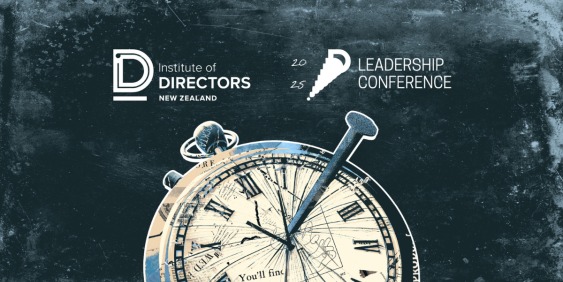Boardroom Premium


Courageous chairing, demographic change and the challenge of leading new boards are reshaping effective governance in Aotearoa New Zealand.
Building trust with stakeholders, responding to demographic change and supporting future generations of directors were central themes on day two of the IoD’s 2025 Leadership Conference in Tāmaki Makaurau Auckland.
In his closing address, IoD Chair Ross Buckley CMInstD urged boards to embrace Aotearoa New Zealand’s changing demographics – with Māori, Asian and Pacific peoples projected to make up a growing share of the population by 2045 – and to draw on untapped workforce segments such as older New Zealanders and emerging leaders. He also stressed the importance of boardroom culture, regular feedback and clear chair-CEO dynamics.
Technology readiness was another strong theme. Buckley challenged boards to move beyond the “bottom quartile” in tech adoption and to actively explore the role of artificial intelligence in governance, citing sessions that demonstrated its practical use.
Nature and climate governance were also highlighted, with a clear message that directors must understand their organisation’s dependencies on nature and ensure risks are mitigated. As stewards of long-term value, boards have a responsibility to embed environmental interdependence into decision-making.
Members were treated to 24 sessions across the two days, featuring 50 speakers on a wide range of topics, including what it means to be a high-performing chair.
A panel of seasoned leaders – Dame Rosanne Meo OBE DistFInstD, George Adams CFInstD and Marama Royal MNZM, MInstD – reinforced that being a chair is not about status, but contribution.
High-performing chairs, they agreed, set culture, demand accountability and create space for courageous kōrero. They know when to lead with heart, when to confront underperformance, and how to keep boards focused on what really matters. Leadership, they concluded, is about contribution over comfort – and relevance over status.
David Kirk CFInstD shared his experience as chair of the newly restructured New Zealand Rugby Board, where nine directors came together as strangers. His first task was not strategy or performance but building trust, setting shared values and creating the conditions for alignment.
Kirk spoke about balancing grassroots expectations with the All Blacks’ global brand, reframing Silver Lake’s investment, and why enjoyment is as essential to high-performing boards as discipline.
One pivotal session explored how directors can build impact and foster trust from the outset. Alison Barrass CFInstD, Jackie Lloyd CFInstD and Herman Visagie MInstD shared advice for the first 90 days on a board: listen before speaking, lead your own induction and build informal relationships to understand board culture. Early credibility, they agreed, comes from thoughtful contributions – not overperformance.
Distinguished Professor Emeritus Paul Spoonley outlined the major demographic shifts ahead: an ageing population, falling fertility and rising cultural diversity. These changes, he said, will reshape the workforce and compel organisations to adapt.
Leaders, he warned, cannot afford to be swayed by political resistance to diversity, equity and inclusion. Demographic change is real – and ignoring it would mean missing out on the benefits of embracing it.
To read more about these key sessions and other conference highlights, don’t miss our special edition of Director Download on Monday.